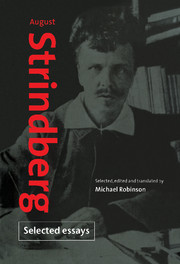Book contents
- Frontmatter
- Contents
- Notes on the text
- Introduction
- from Vivisections (1887)
- ‘On Modern Drama and Modern Theatre’ (1889)
- from Vivisections II (1894)
- ‘Césarine’ (1894)
- ‘Deranged Sensations’ (1894)
- ‘In the Cemetery’ (1896)
- from Jardin des Plantes (1896)
- ‘On the Action of Light in Photography’ (1896)
- ‘A Glance into Space’ (1896)
- ‘Edvard Munch's Exhibition’ (1896)
- ‘The Synthesis of Gold’ (1896)
- ‘Contemporary Gold-Making’ (1896)
- ‘The Sunflower’ (1896)
- ‘The Mysticism of World History’ (1903)
- ‘August Strindberg on Himself’ (1909)
- Notes and commentary
- Index
‘Edvard Munch's Exhibition’ (1896)
Published online by Cambridge University Press: 18 December 2009
- Frontmatter
- Contents
- Notes on the text
- Introduction
- from Vivisections (1887)
- ‘On Modern Drama and Modern Theatre’ (1889)
- from Vivisections II (1894)
- ‘Césarine’ (1894)
- ‘Deranged Sensations’ (1894)
- ‘In the Cemetery’ (1896)
- from Jardin des Plantes (1896)
- ‘On the Action of Light in Photography’ (1896)
- ‘A Glance into Space’ (1896)
- ‘Edvard Munch's Exhibition’ (1896)
- ‘The Synthesis of Gold’ (1896)
- ‘Contemporary Gold-Making’ (1896)
- ‘The Sunflower’ (1896)
- ‘The Mysticism of World History’ (1903)
- ‘August Strindberg on Himself’ (1909)
- Notes and commentary
- Index
Summary
However incomprehensible are your words, they have their charm.
Balzac – SéraphitaEdvard Munch, 32 years old, the esoteric painter of love, jealousy, death and sorrow, has frequently been the object of deliberate misunderstandings by the critic-executioner, who practises his profession impersonally, at so much a head, just like the executioner.
He has come to Paris to find understanding among the initiated, with no fear of being annihilated by ridicule, which kills the cowardly and the weak but like a beam of sunlight increases the lustre of the brave man's shield.
Someone once remarked that one ought to set Munch's canvases to music in order to explain them properly. That may be true, but while we await the composer, I shall sing the praises of a number of these paintings, which recall Swedenborg's visions in The Delights of Wisdom Concerning Conjugal Love and The Pleasures of Insanity Concerning Scortatory Love.
The Kiss: –The merging of two beings, of which the smaller, shaped like a carp, appears ready to devour the larger, as is the custom with vermin, microbes, vampires and women.
Or else: The man who gives, creating the illusion that woman repays. The man who begs to be allowed to give his soul, his blood, his freedom, his peace of mind, his well-being in exchange for what? In exchange for the happiness of giving his soul, his blood, his freedom, his peace of mind, his well-being.
The Red Head: A shower of gold which falls over the unhappy creature kneeling before his worst self, begging a merciful death with a blow from a hairpin. Golden ropes which bind him to the earth and suffering.
- Type
- Chapter
- Information
- August Strindberg: Selected Essays , pp. 167 - 169Publisher: Cambridge University PressPrint publication year: 1996



